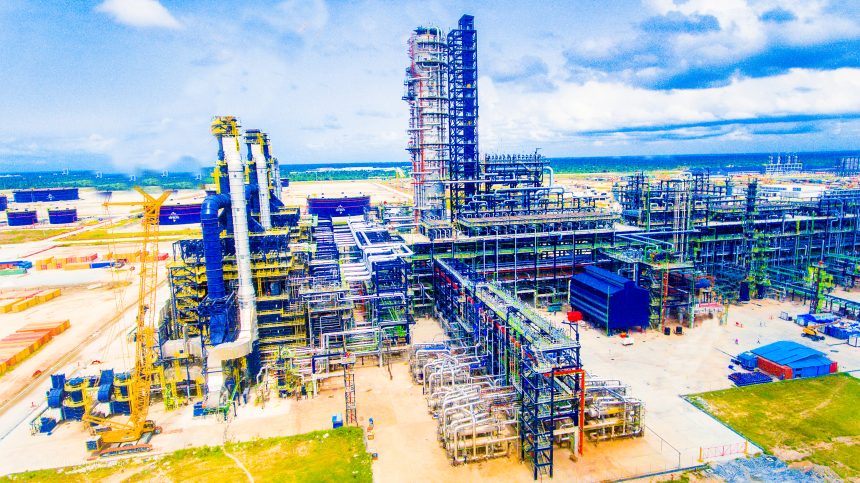Dangote Refinery Seeks 11 Million Barrels of US Crude to Offset Domestic Shortfalls
By Patience Ikpeme
In a strategic move to address the chronic shortfall of domestic crude oil supplies, Dangote Petroleum Refinery and Petrochemicals has issued a tender for an additional 11 million barrels of US crude oil over the next six months.
This decision underscores the ongoing challenges faced by Nigerian crude oil producers in meeting the refinery’s feedstock requirements.
The 650,000 barrels-per-day refinery, situated in Ibeju Lekki, Lagos, has been compelled to look abroad due to unreliable domestic supplies. Since the beginning of 2024, the refinery has already received 9 million barrels of West Texas Intermediate (WTI) crude from the US. The new tender, closing on July 21, aims to secure two million barrels per month of WTI Midland crude starting in August, to ensure a steady supply chain for the world’s largest single-train facility.
Bloomberg reported that Dangote Refinery has recently purchased five million barrels of WTI Midland crude, slated for delivery in August and September. The company has also initiated a tender process for an additional six million barrels of American crude for September delivery. This growing dependence on US crude highlights the challenges Nigeria faces in sustaining its refining needs, largely due to issues such as crude theft, aging infrastructure, and underinvestment which have caused a decline in production.
Nigeria’s oil production has struggled to meet expectations, with daily output in April recorded at just 1.45 million barrels per day, significantly lower than the country’s capacity of 2.6 million barrels per day. The nation faced an estimated underproduction of 30 million barrels in the first four months of 2024, further complicating efforts to meet domestic refining demands.
Dangote Refinery is pivotal to Nigeria’s ambition of becoming a net exporter of petroleum products. Aliko Dangote, President of Dangote Group, emphasized during the Africa CEO Forum 2024 that importing crude remains essential to maintain refinery operations amidst insufficient domestic supply. “It also makes economic sense for us to tender for crude. If we could source 100 percent Nigerian crude, then fine, but we can’t wait,” said Dangote. He also highlighted the difficulties in sourcing the required volume and variety of crude locally, citing a need for diverse types and mixes to optimize refinery operations.
In the first half of the year, the refinery processed over 41 million barrels of feedstock during test runs and incremental processing rate increases. Approximately a quarter of this supply came from the US. Data from CAS indicates that the refinery received 11 WTI cargoes, equivalent to 9 million barrels, between February and May, compared to around 18 million barrels of Nigerian crude deliveries.
The Nigerian National Petroleum Company (NNPC) has faced significant challenges in meeting its 300,000 barrels per day obligation to the refinery due to operational constraints.
International financial analytics firm S&P Global has highlighted the Dangote Refinery’s potential to alleviate Nigeria’s foreign exchange issues and ease pressure on the local Naira currency. This was revealed during an onsite visit by S&P Global as part of its sovereign credit ratings assessment of Nigeria, alongside officials from the Federal Ministry of Finance. S&P Global underscored that the refinery would significantly bolster Nigeria’s oil sector and positively impact the nation’s economy.
Currently operating at a capacity of 350,000 barrels per day, the refinery is set to increase its capacity to at least 500,000 barrels per day by July/August. This expansion will enable the production of petrol and ultra-low sulphur diesel. Vice President of Oil and Gas at Dangote Industries Limited, Devakumar Edwin, stated that the refinery is designed to process a diverse range of crudes, including those from Africa, the Middle East, and US Light Oil, adhering to Euro V specifications and various international environmental norms.
Highlighting a significant achievement, Edwin noted the pride in a Nigerian company designing and building the world’s largest single-train refinery complex, acting as its own Engineering, Procurement, and Construction (EPC) contractor. The refinery, equipped with a self-sufficient marine facility capable of accommodating the world’s largest vessels, is positioned to meet 100% of Nigeria’s demand for gasoline, diesel, kerosene, and aviation jet fuel, with surplus products available for export.
The Dangote Refinery’s continued reliance on US crude underscores the critical need for improvements in Nigeria’s domestic oil production capabilities, while also marking a significant milestone in the country’s refining capacity and economic development trajectory.




